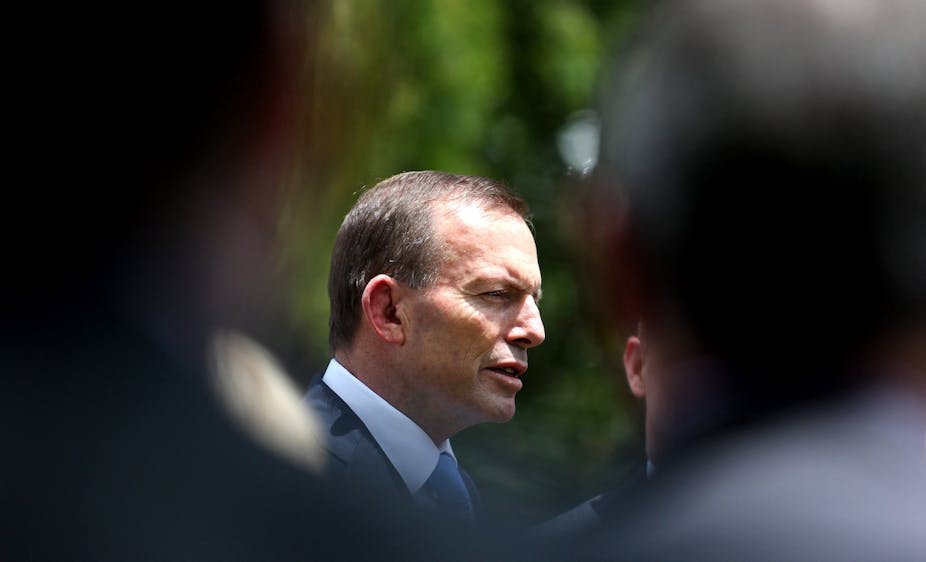In a speech delivered at ANU in April last year, then shadow environment minister Greg Hunt looked toward Australia’s host role for the G20 during 2014. Regarding climate policy he said Australia should:
“task the G20 with a special responsibility for negotiating a four-way compact between [a ‘G4’ of US, China, India and the EU].”
He went on to claim (plausibly) that there was “still a role for the UN system but the real solution is within the G4 concept”.
Abbott’s campaign to de-couple the G20 and climate policy
Despite this proposed “tasking” of the G20, Prime Minister Tony Abbott has now ruled that its agenda is not to be “cluttered” by any consideration of climate policy. Abbott claims this would distract from a focus on economic growth.
In so denying major links between economic growth and climate policy, Abbott is (almost) alone, standing apart from international leaders like US President Barack Obama and IMF President Christine Lagarde. He also ignores the findings of mainstream business as expressed by the Committee for the Economic Development of Australia (CEDA), which underlined these links in its report of July 2014.
G20: an important forum and mechanism for climate policy
As Hunt had once suggested but as Minister no longer acknowledges, the G20 is indeed an ideal forum to engage the G4 on climate change policies. But this hardly exhausts the G20 links with climate change policy. For example, the G20 can jointly engage countries other than the G4 that are major national sources of emissions in both absolute and per capita terms.
The G20 has also focused on the central task of facilitating the financing of low-emissions investment or “climate finance”. It has also pressed for an end to distorting subsidies to energy consumption.
G20 membership also encompasses major countries at significant risk from future catastrophic climate change itself. Political impacts of climate change could include large-scale “climate refugees” and dubious, unilaterally-imposed “climate engineering” projects. They could also include autocratic and militarised global policy responses euphemistically described as “adaptive”.
Climate finance
Since its reinvigoration after the 2008 global financial crisis (GFC), the G20 has taken a close interest in “climate finance”. This focus has been in close consultation with the International Energy Agency (IEA).
The IEA’s annual Outlook Reports have consistently focused on the need to prevent a dangerous temperature increase of 2 degrees Celsius by 2050, requiring that atmospheric levels of greenhouse emissions be held to no more than 450 ppm CO2 equivalent by the same year. IEA emphasis has been on the dual problems of carbon lock-in and minimising the uncertain context of long term mitigation investment and its financing. Addressing both problems is integral to global climate investment and financing.
The IEA’s research in climate financing is reflected in its World Energy Outlook 2011 (pp. 224-25), and its Climate Investment Report of June 2014. This latter analysis follows an important ODI report of 2012.
Phasing out subsidies to fossil fuel consumption
The most tangible action so far taken by the G20 relevant to climate mitigation since 2009 has been its encouragement of phasing out fossil fuel consumption subsidies. The IEA found that in meeting the 450 ppm CO2e target, “a partial phase-out” would account for “12% of the reduction in emissions and would also support energy efficiency efforts”.
Estimated global energy subsidies, 2007-2010 ($billion, nominal)

In addition, existing excise tax rates on transport fuels are often far from sufficient to offset associated external costs.
Fuel tax in OECD countries 2010 ($/gallon)

Reducing these subsidies and correcting instances of under-taxation would also encourage more economically efficient use of energy as well as reducing these other social costs and budgetary pressures. Middle class beneficiaries of current policies (for example in the Middle East) may or may not be compensated, but sound economic development would be unambiguously enhanced ─ a case of “no regrets” mitigation policies.
Australia’s “national interest” in mitigating climate change
It is relevant that Australia is the highest OECD carbon emitter in per capita terms, that its affluence means it can afford to contribute, and that it is one of the major coal exporters. And given both the direct and indirect effects of climate change, Australia is among the vulnerable regions.
Reducing subsidies to fossil fuel consumption is important. However, pricing carbon internationally, against which Abbott openly crusades, is the most cost-effective core means of reducing global carbon emissions. Regulating closure of coal-fired power stations, whether in China, Japan, other coal-importing economies or otherwise, also effectively mitigates global climate change. Either mechanism will also somewhat reduce long-term revenues from coal exports. Which is why special interest groups like the thermal coal exporters tend to oppose all such cost-effective climate policies.
Scandalously, those Australian governments most subservient to these special interests have therefore gone so far as to sabotage or wreck the international cooperation so necessary to mitigate global climate change ─ not merely been laggards in the domestic mitigation effort.
This subservience explains both John Howard’s decade-long refusal to ratify Kyoto (1997-2007) and now Abbott’s campaign to rid the G20 of climate policy “clutter”.
For these two governments, not the slightest diminution in long-term coal export profits is tolerable. Both appeal to a distorted construction of “national interest” that is both against global ecological security and internationally irresponsible.

